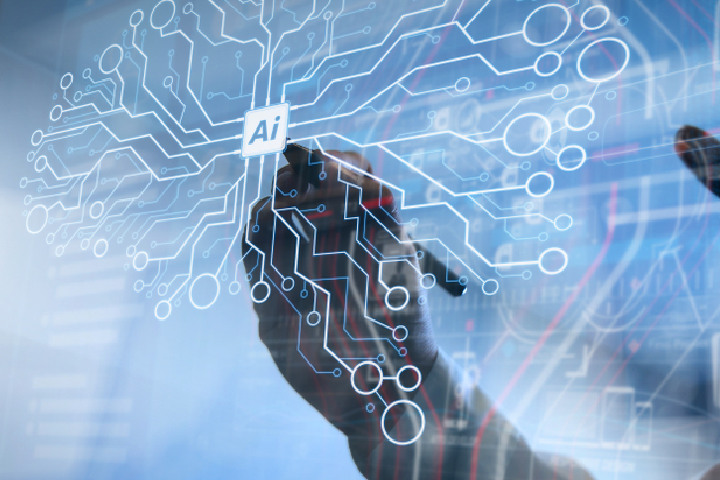Artificial Intelligence (AI)
Top 10 Startups in India That Use Ai To Solve Daily Problems
Top 10 startups in india using Artificial Intelligence (AI) to solve daily problems. Artificial Intelligence (AI), the most celebrated technology in the 21st century.

Artificial Intelligence (AI), the most celebrated technology in the 21st century, is all set to bring a series of revolution in the tech industry. If AI is still alien to you, you should better get acquainted with this AI for the advantages it has to offer.
AI is the conceptual machine designed by humans that is smart enough to perform even the most complex cerebral tasks on its own. Because of its accuracy and agility in performing tasks, AI has been embraced by various industries like Healthcare and medicine, Education, Marketing, Small business, Retail and e-commerce, Public Relations and Recruitment, and human resources for daily assistance. The leading start-ups in India are leveraging AI to solve daily problems and grow their respective businesses.

Table of Contents
1. How does the machine learning algorithm benefit both the service provider and its clients?
OYO, a hotel booking start-up founded by a 19-year-old boy is now India’s go-to app for booking hotels at a reasonable price. Recently OYO has acquired Dinamica, a data science company with Machine Learning and business intelligence capabilities. Now it will implement ML-enabled pricing and revenue management through which customers would be able to book vacation homes at the best price.
Rivigo serves major brands like Marks & Spencer and Maruti Suzuki, with its unique driver relay mode. This Logistics startup uses AI and ML-based technologies to optimize fuel costs, maximize truck utilization, and minimize dry runs for trucks to make its tasks hassle-free and fast.
Playment: The automated vehicle can move without any human input depending on the sensors, Mapping and Localization, Trajectory Planning, and Motion Control. Playment provides data training, algorithms to find relationships, pattern detection, complex problem detection, and decision making to make a machine learn things and perform tasks independently.
2. Is AI helpful enough in keeping you fit?
Cure.fit is a fitness, therapy, and healthcare provider that runs over 100 fitness centers across India. Now it has also adopted AI to capture a lot more immediate data of their clients to deliver them the better service based on their own data reports.
Nineleaps is using ML algorithms to improve the effectiveness of healthcare services. With the help of the ML algorithm, the organization identifies the correlation between healthcare entities to develop a health knowledge graph. The different datasets acquired through the entities’ can be clubbed together with customer-specific data that can be used to improve the healthcare services across the globe.
Another example of AI’s existence in healthcare is Mfine. Mfine is a health-tech AI startup from India, whose system has the ability to diagnose over 1200 common diseases and it can also read hundreds of health parameters in the diagnostic reports which help doctors work effectively without wasting their time on trivial things. Mfine is ready to take a huge leap with tripling its investment in AI.
3. Could AI detect frauds?

Yes, undoubtedly. The growing cases of fraud have always been a point of major concern for payment gateways. Razorpay, a business process payment company, has acquired Thirdwatch that provides SaaS-based fraud detection. The trust score based evaluation technique is used to identify if the transaction is genuine or fraudulent in real-time. The Return-To-Origin losses are under control since the AI technology has been enforced by the company.
4. What does AI have for insurers?
Acko, a general insurance company, is using AI to streamline its operations to engage with the target audience effectively and facilitate sales. AI enables insurers to apply machine learning, predictive analysis, and data modeling to the entire insurance value chain to improve the quality of service and enhance customer satisfaction.
Digital Insurance, a Bengaluru based tech insurance company is employing machine learning for faster reconciliation, fraud management, float management, and claims settlement. The company says that AI would bring down the management cost and it would also reduce the turnaround time in the future.
5. Has the thought of managing everything with a single app ever struck your mind?
An AI-driven hyperlocal concierge app Dunzo has made task management easy irrespective of the complexity of the task. With the help of the Dunzo app, you can create your to-do list and collaborate with vendors. You can also manage your personal tasks through the app, and it could be anything from paying bills to repairing stuff.
6. Why should you deploy AI in your business?
Earlier Artificial intelligence was only affordable and accessible to giant organizations but things are changing now. The spiking need for AI has brought down its cost, and it is now readily available to small businesses and startups.
There is literally no industry in the world that is untouched by Artificial Intelligence because AI can be used to counter any problem that we face in day to day life.
AI would help businesses to increase their sales, improve customer experience, detect fraud, automate work processes and provide predictive analysis.
We have all witnessed the usefulness of AI-based virtual assistance chatbots like Siri, Alexa, OK Google, and Cortana. They have taken off our workload to a considerable extent.
Deployment of machines in critical areas prevents human errors and improves accuracy, which is crucial for organizations that want to provide their clients with top-notch service.
A large amount of data can be processed within the blink of an eye and that too to the zenith of perfection.
Further, AIs are continuously evolving to reach remote areas that are unexplored by humans. We will soon see AI as one of the dominant technologies in every industry and in our lives.
The start-ups are highly relying on Artificial Intelligence for the processes; where speed, accuracy, data processing, and cost are the driving factors. To make the outcome of your work more fruitful, it becomes important to manage your resources wisely in which only AI can help you. The adoption of such technologies gives you a maximum yield with limited efforts.
Helpful Resources:
1. Why is Cybersecurity Important For Enterprises?
2. 5 Website Security Tips Every Employee Should Know
3. Impact of Artificial Intelligence (AI) on Software Development Industry in [2019]
4. Do Human Translators Have a Reason to Be Afraid of Advancing Technologies
5. Artificial Intelligence And Its Demands To The Programmers
6. Artificial intelligence (AI): Friend or Foe to Future Designers?
AI Tools
A Guide To Using AI for Knowledge Management
Using AI for knowledge management and to transform massive data pools into actionable insights is not just beneficial; it’s becoming a necessity to stay competitive.

In the digital era, the fusion of AI technology with knowledge management is revolutionizing the way organizations manage and exploit their informational assets. Using AI for knowledge management and to transform massive data pools into actionable insights is not just beneficial; it’s becoming a necessity to stay competitive. Keep reading to unlock the full potential of AI-driven knowledge management.
1. The Intersection of AI and Knowledge Management: A Synergy Explained
Knowledge management traditionally involves capturing, organizing, and distributing knowledge across an organization. When AI steps into this territory, the potential for enhanced efficiency and decision-making emerges. AI algorithms can sort through and analyze data at a rate no human can match, revealing patterns and insights that can be critical for strategic planning. This melding of AI with knowledge management practices is a modern alchemy, creating an invaluable resource.
One of the most significant benefits of integrating AI into knowledge management is the automation of data processing. AI systems can continuously learn from new data, refining their algorithms and providing even richer insights over time. Moving from static data repositories to dynamic knowledge hubs, businesses are now armed with constantly evolving intelligence. This represents a profound shift from data being a static historical record to a dynamic, predictive tool for decision-making.

Customization is another strong suit of AI in this space. Rather than one-size-fits-all information resources, AI can personalize knowledge dissemination to the needs of each employee. The focus moves beyond mere information access to ensuring the right knowledge reaches the right person at the right time.
2. Implementing AI in Your Knowledge Management Strategy
Transitioning to an AI-driven knowledge management system begins with identifying the scope and objectives of knowledge needed. Organizations must be clear about the kind of knowledge that is most valuable and how AI can aid in its cultivation and dissemination.
Following initial evaluations, the selection of appropriate AI tools and technologies becomes the next crucial step. There are various AI solutions designed for specific knowledge management tasks, from natural language processing for content analysis to machine learning models that predict trends and behaviors.
Integrating AI requires a cultural shift within the organization. Employee buy-in is crucial, and it is important to address any concerns about job displacement head-on. Training and educating the workforce on the benefits and use of AI systems can facilitate smoother adoption, ensuring everyone understands the role of AI as a partner, not a replacement, in the knowledge ecosystem.
3. The Impact of AI on Knowledge Retention and Dissemination

The true value of AI in knowledge management is often most visible when assessing knowledge retention and dissemination within the organization. AI-driven systems can significantly enhance the ability to capture institutional knowledge, store it and make it available in engaging, interactive formats that increase retention.
Analytics are also central to measuring the impact of AI on knowledge management. By evaluating these metrics, businesses can see whether the knowledge is being leveraged effectively, which areas may need more focus, and where improvements can be made.
Furthermore, AI can be a boon for training and development programs. By adapting to the learning pace and style of individual employees, AI can deliver personalized training recommendations and content, leading to more effective learning outcomes.
Altogether, AI is transforming the realm of knowledge management with its capacity to automate, personalize, and revolutionize how information is processed and utilized. Challenges notwithstanding, the rewards of integrating AI into knowledge management strategies are profound, paving the way for smarter.
-

 Instagram4 years ago
Instagram4 years agoBuy IG likes and buy organic Instagram followers: where to buy them and how?
-

 Instagram4 years ago
Instagram4 years ago100% Genuine Instagram Followers & Likes with Guaranteed Tool
-

 Business5 years ago
Business5 years ago7 Must Have Digital Marketing Tools For Your Small Businesses
-

 Instagram4 years ago
Instagram4 years agoInstagram Followers And Likes – Online Social Media Platform
















